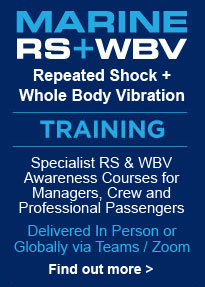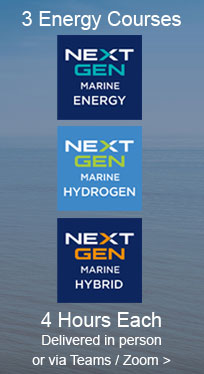Sarah Kenny - MASS 2020 Conference Keynote

16.01.2020

Once again, I am delighted to be here. I must confess that given this is the third time in a row that I have spoken, there has been much scratching of heads to think of a topic that is both distinctive and builds on the previous two!
In the past I have spoken about whether autonomy is a good thing for business and society, setting out potential scenarios for the future driven by autonomy and technology.
Last year, I spoke about the wider implications of autonomy and advanced technology. I also highlighted the need to look at the potential impact on jobs and the need to develop the skills for the future.
For this conference, I would like to look forwards, as we enter the new decade, and explore how the pace of technological change will create challenges, that industry, governments and regulators will encounter as we move deeper into the Fourth Industrial Revolution. I will place particular emphasis on the role and future challenges faced by regulators.
Development of smart and autonomous ships, smart ports, and smart trading systems, exploiting advanced technologies such as satellite communications, sensors, smart data acquisition and analytical capabilities, and intelligent systems, potentially offer significant benefits, which will be critical to enable the full realisation of an efficient and dynamic maritime trading ecosystem.
The realisation of these technologies of the fourth industrial revolution is happening at pace. We only need to look back over the last decade to see how much things have changed - the development of the smart phone, 4G (and now emerging 5G) mobile network technologies, internet banking and shopping, the proliferation of social media... have radically altered the way we live and work.
Noting the title of the conference, The Tide has Turned, we now need to recognise that we cannot stand still, we cannot hold back this tide of progress. However, as this technology-driven disruption impacts the maritime sector, we are faced with the reality of maintaining productive, continuous, safe, efficient maritime operations as part of a truly global industry where others may not adopt at pace or at all.
We need to recognise that not all nations and operators have the wherewithal or desire to travel at the same pace, and it is against this backdrop that we need to consider the future of regulation and how we lead it.
I suggest, that with the unprecedented rate of change of both technology, and business and workforce trends, coupled with ever increasing levels of sociological and geopolitical complexity, our regulatory systems must not just respond to these challenges, but also be proactive in addressing this future world, building a future regulatory environment that enables businesses to be competitive and exploit technologies as they emerge.
I should also add that we are not alone in facing these challenges; other sectors such as Automotive, Aerospace and healthcare face the same issues.
So, lets dive a bit deeper into what this could mean in regulating the maritime enterprise:
• Rapid technological progress - will require us to constantly adapt regulations to ensure technologies are developed, deployed, and used effectively. As a result, regulatory authorities will need to be more agile and adaptable to support the safe exploitation of technologies as they emerge and disappear!
• The convergence of technologies - across land, sea, air, space and cyber domains, will necessitate a more collaborative multi-front approach to regulation, challenging traditional silos, requiring regulators to be more innovative and creative in developing future regulatory environments, and looking for solutions from other sectors.
• Businesses operating globally rather than within national boundaries - working with huge volumes of information and increasingly complex systems. Speed of response will be critical, and if our regulators do not respond quickly enough, they will be potentially ignored or side-lined
• A changing workforce - with far more complex and diverse notions of culture, identity, loyalty and expectations of meaningful and purposeful work, we will need to be more flexible, adapting approaches appropriate for the differing audiences.
• The adoption of AI related technologies - requiring us to consider how to develop a regulatory system that enables us to cope with systems that continue to develop “at sea” as learning progresses.
• Changes to the way that humans and systems work together - we will need to address both human and technology elements together in future regulations.
In addition, we will have to come to terms with the value, and use, of the totality of an unprecedented volume of combined data. Decisions made under pressure will be analysed calmly with hindsight by others. Today’s information will be there forever and may be assessed in a future with different value systems - recent air accidents are a case in point. This has a major impact on the need for awareness and forward thinking and is an issue we will need to have front of mind.
To identify how to meet the demands of modern – and future – regulation, we also need to consider the skills we will need in our workforce. Understanding the expectations of the next generation is key to designing an environment that will attract the right people and skills that allow employees to thrive within it over the coming decades.
This leads to a number of questions:
• How does the enterprise respond, and create a regulatory workforce of the future?
• How does it create a public and private sector regulatory environment where new processes, leadership and management create new ways of thinking, and allow new ideas and technologies to be exploited?
• How does regulation become more agile and data driven?
• How does regulation attract and support the right people?
The answer will lie in our leadership. There will be a need for potentially different future leadership skills, organisational paradigms and innovative support systems to nurture them.
We need to curate thought leadership in order to ensure the regulatory environment and business it supports is both ready and fit for purpose. We need to evolve organisational leadership and skills structures, that are ready for the disruption these trends will bring.
We should over the next few years, expect to be confronted by skills shortfalls, particularly in high-skilled areas where we are competing with higher paying roles in finance and tech. We will need to do more to demonstrate both why regulation and this sector are exciting and important.
Leaders will need to recognise that their teams core skillsets will be different. The role of regulators will increasingly be highly technically competent, with skills in engineering, data science and cyber security, which must be combined with an understanding of the maritime environment and operations. There is already a massive shortfall of such people, and if we don’t act, we will face challenges around recruiting them.
The future regulatory workforce will need to be ready to process complex varied new sources of information and reach informed and ethical decisions that address multiple stakeholders needs. So, it’s not just a challenge to attract then, we also need to develop and retain them, and the training approach therefore needs to shift from ‘we’ll train you’ to ‘we’ll help you learn’. It should instil critical thinking skills and ethical decision making, that allow people to develop and evolve in a constantly changing environment. We will likely have younger leaders in a generation - we need to nurture the adaptive critical thinking skills that leaders need, not just teach them how to follow the rules and processes.
In the future we should expect to see further challenges: cyber security, disruption to trade routes, developments in international law, relationships, trading patterns and the impacts and implications of climate change. This changing ecosystem poses a significant challenge to how resilient our maritime sector is, and the way we continue to regulate it.
In addressing these regulatory challenges, the ethos of collaboration and cooperation that underpins the enterprise is significant. But it needs highly effective leadership of highly trained people to deliver it successfully.
Only with a dynamic and future-focused leadership approach can we transform the sector and its regulation. We must be ready to harness this change to global benefit, developing nd deploying innovative methods and techniques to continue to ensure a safe and secure maritime arena.
All images are copyright Hybrid Marine Power 2024 unless otherwise stated.
This does not exclude the owner's assertion of copyright over the material.
eNews
15.04.2024
MariNH3 Conference 2024
MariNH3 Conference 2024 is being held at Grand Plaza Hotel,…
eArticle
06.10.2023
Challenges of Unpredictable Marine Energy
From running Energy Transition training for significant maritime organisations technology…
Video
Round The World solar boat Turanor PlanetSolar
MS Tûranor PlanetSolar is the largest solar boat in the world. This 35 metre (115 feet) catamaran operates solely on…







